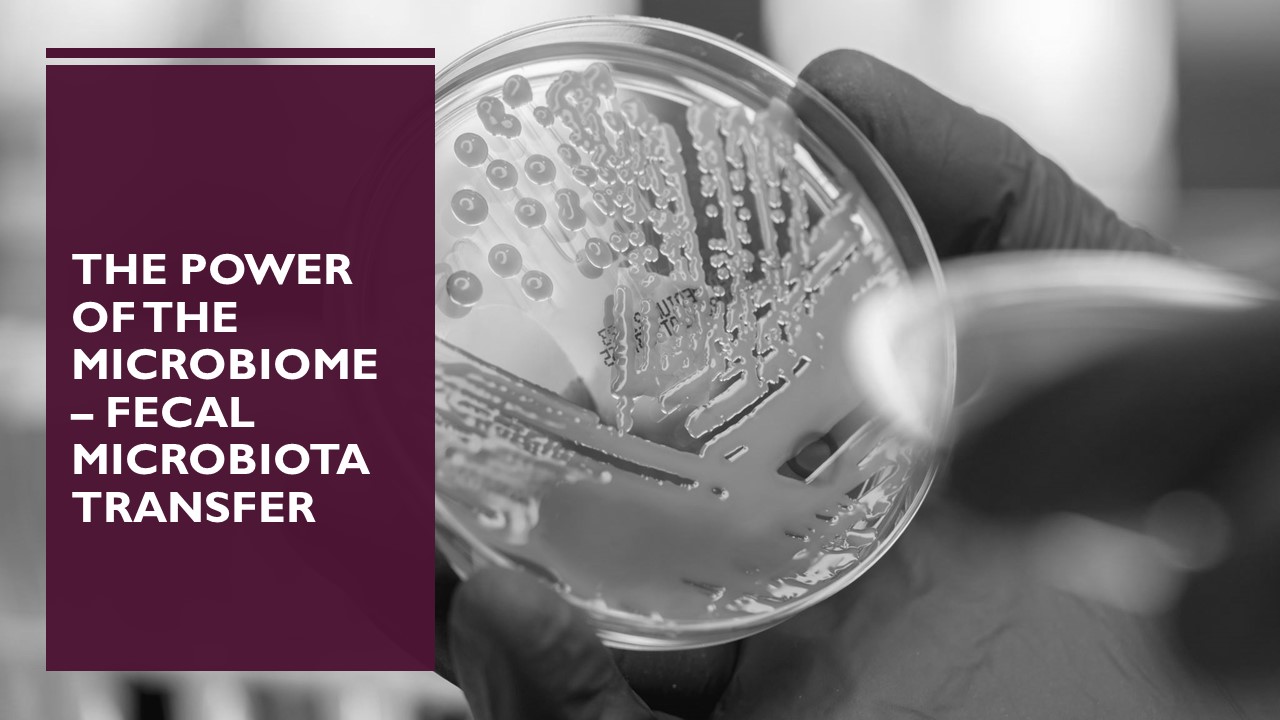FMT – fecal microbiota transfer/transplant. As the name implies, a portion of the feces from one person, the donor, is being transplanted into a recipient in poor health. You’re probably thinking, first after gross, why in the world would someone do that? What’s the point? Great question. FMT is a highly effective treatment. And it perfectly illustrates the power of the microbiome. It’s a significant change which happens at a single (or possible several) time point, and any positive outcomes are easily attributable to it.
Historical accounts linking FMT and disease date back to the 4th century BC in China when human fecal suspension was used to treat patients with food poisoning, diarrhea, and those with fever and imminent dying. Today, the vast majority of its use is in the treatment of recurrent C-diff infections. I mention C-diff infections a lot in my presentations, because it’s the ultimate example of dysbiosis. FMT efficacy for C-diff is about 85-90%. Which is astonishing for these very ill people, and more efficacious than antibiotics.
The costs for C-diff infections and recurrent infection are in the billions each year. Some hospitals struggle with re-admission penalties. On average, 20% of initial C-diff infection will result in a recurrent infection, which makes over 80,000 per year in the US alone. Many of those will have multiple recurring infections. And then of course, there’s the morbidity and mortality. Tens of thousands of people will die each year from a C-diff infection. As amazing as FMT is, it can be done better.
But first, after explaining what exactly FMT is, I begin my video presentation with a series of cases studies where FMT was able to reverse such terrible conditions such as depression, Alzheimer’s and Autism. That’s right, reverse. To varying degrees. I also cite case studies for other conditions.
Then I depart case studies, and move into trials and reviews on these same conditions, and more, to include ulcerative colitis, Parkinson’s disease and metabolic syndrome. All of these examples, illustrating the power of the microbiome.
I end with explaining which bacteria are playing such a key role in these incredible changes. If you’ve been watching my videos, they are the same players that keep coming up over and over again.
I don’t offer you FMT therapy. If you decide to go that route, that’s fine. What I offer is the next best thing. The ability to drive significant change in the microbiome via the intelligent use of properly dosed and blended prebiotics customized to the microbial fingerprint of a given condition/disease.
This approach has a role in supporting FMT. Many studies show, that with time, the newly transplanted microbiome loses its similarity to that of the donor. Given factors, especially diet, the new recipients may not be able to maintain the healthy profile they were given, and thus possibly lose out on the therapeutic benefits.
Whether it’s in clinical trials for FMT, or treating recurrent C-diff infections in the hospital setting, I can help. Selecting the correct donor for the appropriate condition and maintaining the donor microbial profile for as long as possible are key drivers to therapeutic success.
You can find my presentation entitled, “The Power of the Microbiome – Fecal Microbiota Transfer” in my Microbiome University tab, and also on my YouTube channel. If you have a condition or disease that you think would be well served by addressing your microbiome, you can visit the Protocols tab on my website where you can find a science-based protocol which may dramatically improve your quality of life, as they have done for many others (see my testimonials). If you work in the hospital setting and are concerned about C-diff infections and readmissions, reach out to me by email on my website. If you are running FMT clinical trials, or have an FMT clinic, and look to improve outcomes, email me on my website.
The references cited within this video presentation (who else is providing you with this?)
Gut microbiome-targeted therapies for Alzheimer’s disease – PubMed (nih.gov)
https://doi.org/10.1016/j.medmic.2020.100029
Weight gain after fecal microbiota transplantation – PubMed (nih.gov)

